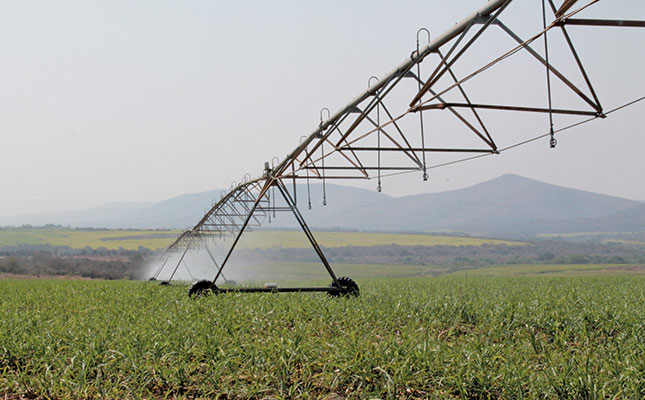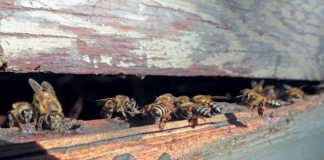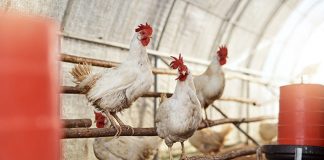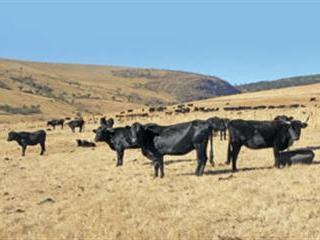
In South Africa, farmers tend to rely more heavily on labour than their counterparts in Europe and the UK where labour is minimal because of the costs involved. On Glencall farm in Merrivale, outside Pietermaritzburg, farmer Gary Mitchell has opted for the overseas labour model. The 1 026ha farm is run by Gary, his son Charles – a qualified toolmaker who has been farming with Gary for five years – and two workers, Pitso Matrose and James Msomi.
The farming activities keep this compact team busy year-round. Much of the work involves maintaining fences and water pipelines. “We make our own cattle troughs and feed rings. I flip tyres, shear the sheep and vaccinate livestock myself. We have not become industrialised, although admittedly we are mechanised in certain aspects. We have to be smarter to get even the simplest jobs done,” says Gary.
Winter hay
Beef farming is the primary agricultural activity on this rugged grass farm that Gary took over from his father in 1985. He inherited an established Drakensberger herd, which he now runs as a 200 breeding cow unit. As he does not sell weaners, about 400 animals must be fed during winter. For this, Gary needs to bale at least 1 200 hay bales off 100ha. Bales weigh between 250kg and 280kg each. In a good season, he harvests up to 1 700 bales.
“Hay-making is the most mechanised job on the farm. We are adequately equipped for this operation, for which we use a Falcon Haymaker, a side delivery fingerwheel rake and a Claas Rolant 46 round baler. Machinery upgrades would help us do the job faster. “This season, most of the hay bales were left in the fields. Direct feeding avoids double handling and saves on diesel,” he says.
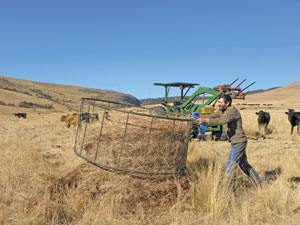
Gary and his son Charles make their own feed rings. This feed ring uses one-third less steel than previous designs, making it lightweight and easier to handle.
For heavy lifting and digging jobs, a front-end loader is hitched onto a JD 6205 tractor. More mechanised farmers use big soil-engaging implements and planters, but Gary does not need these as he does not plough and plant in the conventional way. “We have basic implements but would rather disc and oversow where we need to rejuvenate pasture. We try to vary the tasks to beat the drudgery factor and always look for simple solutions that often require some thought but are not necessarily expensive,” he says.
One example is using the Winchester clamp (see box right) instead of a regular pipe clamp. This wire-tying technique saves water and avoids the need to buy clamps. The technique is very simple. A galvanised wire is looped around the pipe to be secured. A spike is then inserted into the loop and twisted around the tail end to secure the plastic pipe to the coupling. Certain jobs, such as burning firebreaks and digging trenches, call for more labour and in these instances, extra hands are hired on a daily basis. Gary is investigating the possibility of employing apprentices from Zakhe Agricultural College.
Back to nature
The Mitchells have consciously gone back to nature, and have established beehives, bat houses, owl boxes and a network of raised permaculture gardens around the homestead. The family uses the fresh produce and any surplus is sold in Howick. Being self-sufficient inevitably means more work on the home front. “We grow organic vegetables, sprouts, herbs and fruit, make our own cheese, butter and bread. We also slaughter sheep for home consumption,” says Gary.
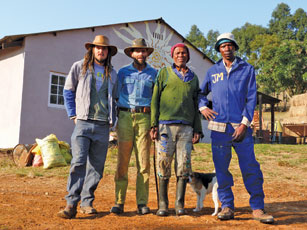
From left: Charles and Gary Mitchell, Pitso Matrose and James Msomi. Photo courtesy of Charles Mitchell
The family developed this approach to farming due to onerous labour legislation and the need to save energy and input costs. The obvious downside is that the work is never done. “It is an ongoing process. The biggest challenge of farming like this is that we have to be physically strong to tackle the tasks at hand. We have to react quickly and safely to whatever job needs to be done and there is little time for recreation or holidays. However, I don’t feel I have to expand to live comfortably. As farmers we have to try and focus on the positive if we want to stay on the land,” Gary concludes.
Diversifying with Dorpers
The year Gary took over Glencall Farm, he introduced a Dorper flock to improve cash flow. He first sourced 70 breeding ewes from Memel in the Free State and thereafter used genetics from John Dell in Grahamstown. Two years’ later, in 1987, he registered his flock.
“When the inspector first visited, he cut my flock in half. Sheep that did not meet the breed standard were sold. It was quite painful,” he recalls. Gary runs 80 to 90 stud ewes with the flock ewes. He has been showing at the Royal Show for 20 years and has won the double championship several times.
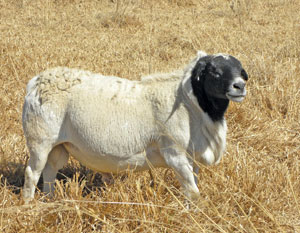
“It’s always good when a Junior Champion goes on to become the Grand Champion,” he says. Although the Dorper is the second-largest breed in South Africa, with a national flock of 7 million, the KwaZulu-Natal Dorper Club is small. “The Dorper society is based in Middelburg so the big stock sales and inspectors are far from us. There are only a handful of Dorper stud breeders in KZN. However, the KZN Dorper Club is growing,” says Gary, formerly chairman of the club.
In summer, the sheep mainly graze kikuyu pasture with a lick. In winter they graze the veld under the eye of a shepherd. Lactating mothers and pregnant ewes also receive a mixture of milled snap corn and Voermol S200, while rams are fed the same feed at the rate of 450g per day throughout the year. Gary uses creep feeding as supplemental nutrition for suckling lambs, especially in winter.
Lambs and ewes are sold at the Lions River Sale with cull ewes sold at informal markets in Howick during the festive season.
“There is always a demand for breeding ewes in this area. For anyone considering sheep, think about your options and visit farmers who have the experience to offer sound advice,” says Gary.
Contact the Dorper Sheep Breeders’ Society of SA on 049 842 2241 or email [email protected]
Contact Gary Mitchell at email [email protected]











